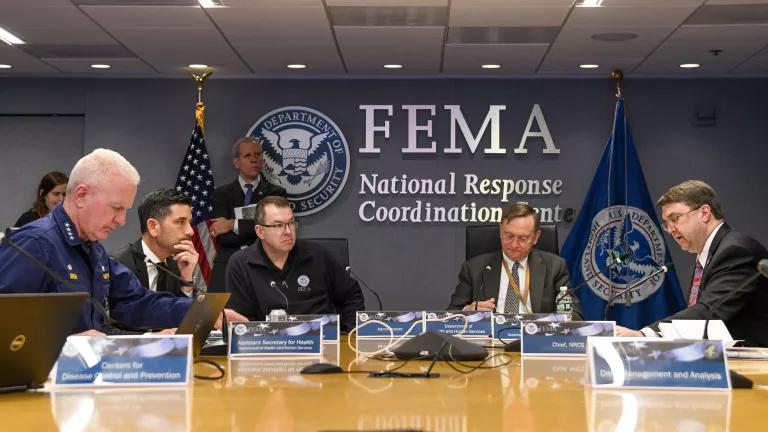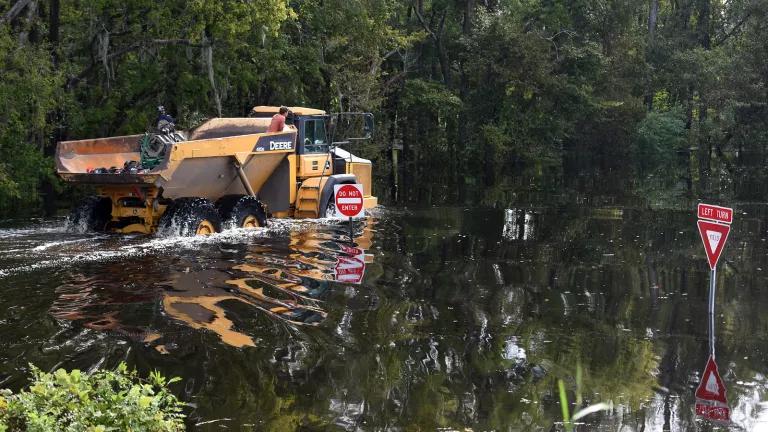To Avoid the Next Disaster, “This Mistake Must Not Reoccur”

Learn more about NRDC’s response to COVID-19.
As the effects of the COVID-19 pandemic continue to roar across the United States, there’s one area where all the experts seem to agree: as a nation, we were woefully unprepared and our response has been sorely lacking.
It is essential for us to understand preceding conditions, identify recent points of failure, and change policies and programs so we are better prepared in the future. This needs to be done in an objective and independent manner—not to assign blame, but to assess the effectiveness of our actions and identify ways we can improve.
And we need to start now to ensure the best chances of success, as retired U.S. Public Health Service Rear Admiral Scott Deitchman and former Federal Emergency Management Agency (FEMA) administrator Craig Fugate recently wrote in the Washington Post.
Congress has taken the first step toward such a review, introducing legislation to create a “Commission on the COVID–19 Pandemic in the United States.” The proposal is modeled after the National Commission on Terrorist Attacks Upon the United States (better known as the 9/11 Commission) and has a similar structure, mission, and set of powers. This is a strong first step toward much-needed improvements in the nation’s public health emergency preparedness and response.
However, the COVID-19 pandemic will not be the last such crisis; more than likely, it won’t even be the only major disaster we face this year. It shouldn’t take an unprecedented catastrophe for us to think about how to improve our preparations for extreme events.
“Those Who Cannot Remember the Past are Condemned to Repeat It”
After Hurricane Andrew devastated southern Florida in 1992, a series of grand jury reports described the human failures contributing to the destruction. One of the reports, which opens with the epigraph “those who cannot remember the past are condemned to repeat it,” summarized its findings as follows:
A major failing of all Floridians has been our apparent inability to learn and retain the important lessons previous hurricanes should have taught us. Each of us has failed to be sufficiently responsible to ask the necessary questions of our governmental regulators, of our construction industry and of ourselves. […] Andrew’s most obvious lesson was that we were not prepared for this hurricane, neither as individuals nor as a community. This mistake must not reoccur.
Florida went on to institute some of the strongest building codes in the nation—until 2017, when state legislation weakened the system for updating those standards, only three months before Hurricane Irma made landfall. This is a perfect example of our current approach to (not) preparing for the future.
Instead, it’s time for a systematic, government-wide assessment of how natural hazards turn into major disasters, whether they’re epidemics or earthquakes, fires or floods. We are failing to turn mistakes into lessons and lessons into action.
We already have a model for how this could work: the National Transportation Safety Board (NTSB) is an independent federal agency that has dramatically reduced death and injuries in the transportation sector through accident investigations and subsequent recommendations. A large part of the NTSB’s success is its objectivity and independence; as a non-regulatory agency, its effectiveness rests on its reputation. And unlike a Presidential Commission, its members cannot be removed except “for cause,” limiting the potential for political interference.
The idea of an “NTSB for Disasters” isn’t new. Its proponents include disaster historians, former FEMA officials, and medical and public health experts. (Fun fact: Captain Sullenberger of the “Miracle on the Hudson” favors something similar for the healthcare sector.) Of course, coronavirus response should take center stage for now, but Congress could build on this commission so that the COVID-19 review becomes the first investigation of a new National Disaster Review Board.
“This Agency-Level Approach Will Not Suffice”
Similar to the NTSB, a National Disaster Review Board might have a few distinct but intersecting missions. First, it would need the authority to conduct impartial, factual reviews of major disasters, including agencies’ preparation, response, and recovery actions. These investigations would go beyond traditional after-action reviews, which rely on self-assessment and are generally limited to a single agency; Fugate, the former FEMA administrator, has referred those reviews as “great pieces of fiction.” Instead, the Board could adapt the NTSB’s collaborative fact-finding approach to leverage the experience and expertise of local groups such as first responders, social services providers, or even members of affected communities.
Importantly, these independent reviews would then support actionable, evidence-based recommendations to federal, state, and local agencies. The recommendations could be incorporated into emergency management plans and used to inform policies, codes, and standards—increasing capacity for climate adaptation and reducing future vulnerabilities. A National Disaster Review Board might even have a research arm, collecting and communicating best practices to reduce risk to health and safety.
In their recent Washington Post column, Deitchman and Fugate outline the need for an independent coronavirus pandemic review panel:
For a catastrophe on the scale of covid-19, this agency-level approach will not suffice […] the scope of the covid-19 assessment must be broad enough to learn what the pandemic reveals about our ability to deal with health crises. That includes understanding how the impact of the outbreak in the United States was shaped by how we prepared our resources: the state of our public health system; the ways we deliver health care across the nation; the roles, responsibilities, and resources of our health agencies; how we do and do not support hospitals and health-care workers; and our medical and pharmaceutical supply lines and purchasing policies.
Investigating governmental response to a hurricane or wildfire might not have exactly the same scope, but applying a similar approach would undoubtedly improve the nation’s resilience in the face of other disasters.
Learning from disasters is more important now than ever, as climate change increases the risk of disease outbreaks as well as extreme weather and other environmental disasters. The intersection of these risks is exacerbating existing health inequities and further burdening low-income communities and communities of color. Meanwhile, COVID-19 demonstrates the challenge of addressing simultaneous crises. Investigating our government’s preparedness for this pandemic is essential work—and let’s not stop there.




